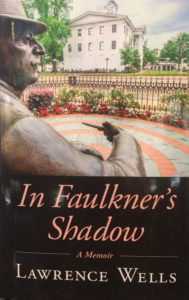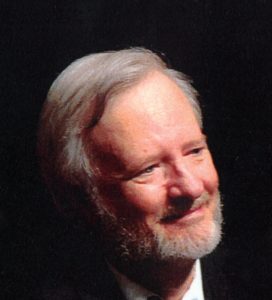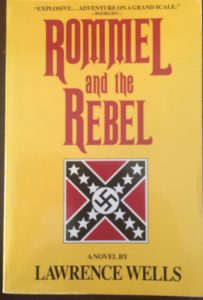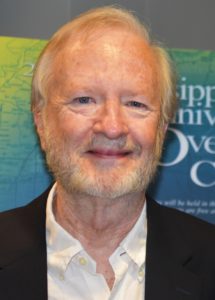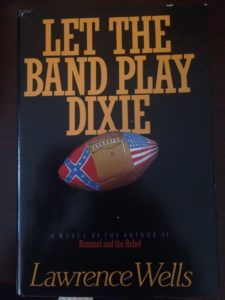Major Works
- Ghostwriter: Shakespeare, Literary Landmines, and an Eccentric Patron’s Royal Obsession, 2024
- Fair Youth, 2024
- In Faulkner’s Shadow: A Memoir (2020)
- Let the Band Play Dixie (1989)
- Rommel and the Rebel (1986)
- William Faulkner: The Cofield Collection (editor)
Biography of Lawrence Wells
Lawrence (Larry) Wells was born September 14, 1941, in Ozark, Alabama. He received his B.A. and M.A. degrees from the University of Alabama and a Ph.D. from the University of Mississippi (Ole Miss). He taught English at Murray State University in Murray, Kentucky. Wells has a son, Lawrence, and a daughter, Catherine, from his first marriage.
After his divorce, he married Dean Faulkner (Wells), the niece of William Faulkner and daughter of Faulkner’s youngest brother Dean. She died in 2011.
In 1975 Dean and Lawrence founded the Yoknapatawpha Press, a Southern regional small press located in Oxford, Mississippi, which publishes works by Southern writers and which also issued from 1981 to 2001 the Faulkner Newsletter & Yoknapatawpha Review. Wells, in addition to running the publishing company, writes novels, writes for magazines, and composes screenplays and telescripts. He is known as Larry or, (according to Willie Morris) as Boss. Wells and his wife Dean were instrumental in raising money to bring Willie Morris to Ole Miss as writer-in-residence.
Wells got the idea for his first novel, Rommel and the Rebel, from an article he read about a Civil War Roundtable in Jackson, Mississippi, where Jack Maxey, a retired lieutenant colonel, gave a lecture comparing Field Marshal Erwin Rommel’s tactics to those of Nathan Bedford Forrest as well as from some research he had done into World War II.
The novel describes a fictional trip three German field marshals — Rommel, Model, and Schorner — take to visit U.S. military sites and schools. In the novel, Rommel leaves the group to explore on his own. Wells says it was “uncanny the way they (Forrest and Rommel) thought alike and used the same tactics.” Interestingly, Wells also has William Faulkner appear by name as an important character in the novel who meets Rommel on his excursions. His wife Dean gave him permission to use “Pappy” as she called him (“Mr. Bill” as Wells called him). Dean’s mother, Louise, said that when she read the novel she could hear Faulkner’s voice.
According to Publishers Weekly, Wells, in his second novel, Let the Band Play Dixie, “combines real-life people and fictional characters, all of whom meet in Gettysburg at an unorthodox football game that accrues unintended symbolic meaning.” A review in Library Journal describes the novel as a story: “Based on events surrounding the first North-South All-Star Football Game played in Philadelphia in 1896, this novel is one part history and three parts fun. Organized by less-than-scrupulous speculators, the event attracts a coterie of gamblers intent on games of chance, scores of Civil War veterans intent on a symbolic rematch, and a black football team, with its female coach, intent on playing for the South.”
Rommel and the Rebel, by Lawrence Wells, published by Doubleday/Bantam in 1986, is a military adventure based on the legend that German General Erwin Rommel, “The Desert Fox” of WWII fame, visited Brice’s Crossroads and Shiloh. The genesis for this novel was a lecture at the Jackson (MS) Civil War Roundtable by a retired army officer who claimed to have been Rommel’s guide.
In 1983, Wells edited Football Powers of the South, a coffee table book containing twelve chapters of historical photos of twelve leading Southern university football programs including Alabama, Auburn, Arkansas, Florida, FSU, Georgia, LSU, SMU, Tennessee, Texas, UNC and Vanderbilt.
In 2020 Wells has published In Faulkner’s Shadow: A Memoir. The memoir was published in September, 2020, and is the story of the marriage of Wells and his second wife, Dean Faulkner, whose father was William Faulkner’s brother.
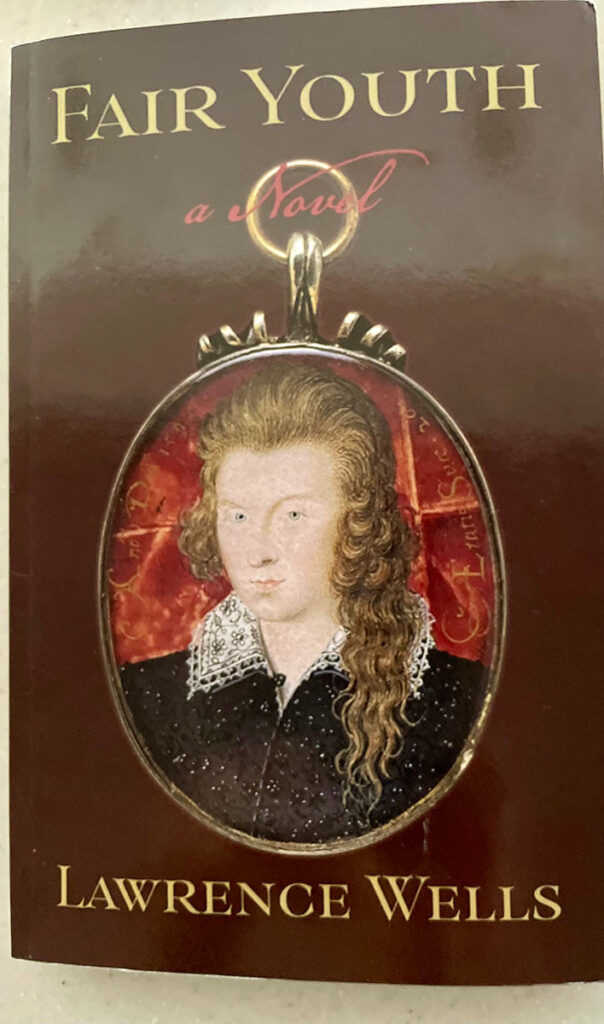
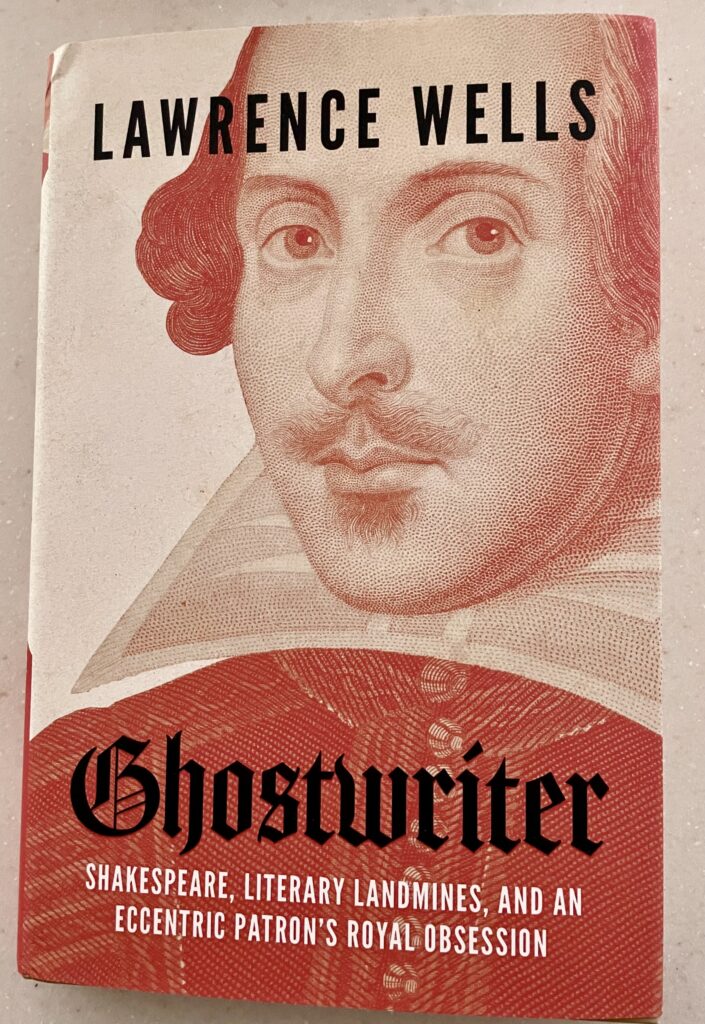
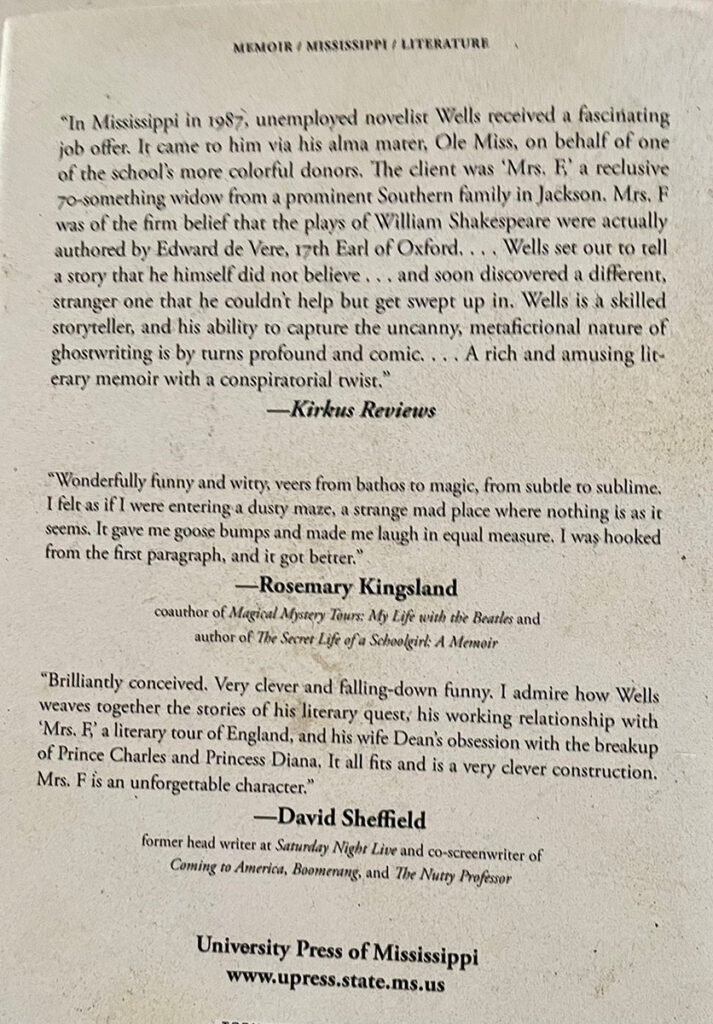
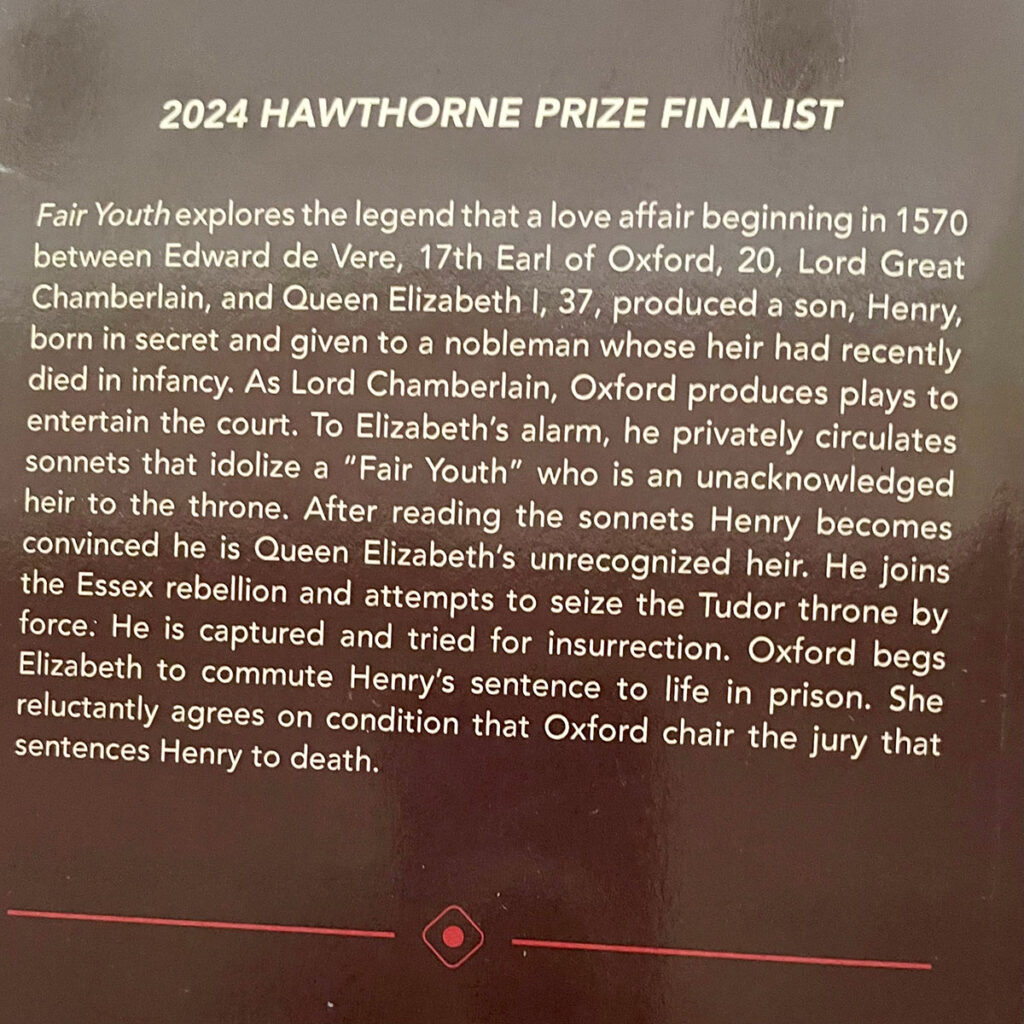
He has most recently published two works: Fair Youth (a Novel) and Ghostwriter: Shakespeare, Literary Landmines, and an Eccentric Patron’s Royal Obsession. Both were published in 2024. (Click on image above to enlarge)
The manuscript of Ghostwriter was awarded the 2014 Faulkner-Wisdom prize for narrative nonfiction at the Words and Music Festival in New Orleans. The work is based on a true story. Wells was hired in 1987 to ghostwrite a novel for a wealthy, eccentric woman who believed she was Queen Elizabeth I reincarnated and that the 17th Earl of Oxford was actually William Shakespeare. For a fuller explanation of the writing of Fair Youth, go to https://www.oxfordeagle.com/2024/07/09/one-request-led-to-two-books-for-lawrence-wells/
Lawrence Wells continues to live in Oxford, Mississippi, with Kathleen Woodruff Wickham.
Note: The following Author Interview was written by Jana Hoops and appeared in the ClarionLedger on September 27, 2020. It is used by permission.
Memoir offers inside look into Faulkner’s inner circle
Oxford author and publisher Lawrence Wells of Oxford offers an insider’s look into life in William Faulkner’s inner circle in his memoir, In Faulkner’s Shadow: A Memoir, recently released by University Press of Mississippi.
When Wells married Dean Faulkner, the only niece of literary giant William Faulkner, in 1972, it didn’t take long for him to realize the weight that fell on the shoulders of family members who struggled to live their own lives independent of the famous author’s sizable persona.
The book delves into the couple’s marriage and home life, and their shared love of all things literary. Together, they founded Yaknapatawpha Press in 1975 (still active in Oxford). It also highlights the evolution of Oxford into a writers’ haven since Faulkner’s death in 1962 – and the almost unescapable web of his fame, with both its blessings and burdens. It was his wife’s death in 2011 that inspired Wells’ desire to write this book.
Wells’ previous writings include two historical novels, Rommel and the Rebel and Let the Band Play Dixie. In 2014 he was awarded the 2014 Faulkner-Wisdom gold medal for narrative nonfiction at the Words and Music Festival in New Orleans. He was also script writer for the PBS regional documentary Return to the River. His magazine articles have been distributed by the New York Times Syndicate.
Author Interview with Lawrence Wells
Hoops: Please tell readers how you and Dean met, when you married, your similar careers, and how life worked out with two sets of children.
Wells: We met in graduate school at the University of Mississippi in 1970. Dean bore a stunning resemblance to her uncle. She was soft-spoken yet with an air of total assurance. We began dating in 1971. A year later we took the leap.
It was the second marriage for each of us. Dean had three children – Diane, 12, Paige, 10, and Jon, 6. My children, Lawrence, 7, and Catherine, 3, visited us on holidays. Family time revolved around meals, school, homework, the children’s activities, and three loads of laundry per day. Every week we attended a peewee basketball game, school play, or church supper.
Our literary partnership began when I edited a photo-biography, “William Faulkner: The Cofield Collection” (Yoknapatawpha Press, 1978). Two years later we backed into the publishing business with the publication of Dean’s “The Ghosts of Rowan Oak: William Faulkner’s Ghost Stories for Children.” Dean and I were hooked on books and each other.
Hoops: Dean was a young teenager when she realized just how famous her uncle was. How was she awakened to that fact?
Wells: Dean grew up off and on at Faulkner’s home in Oxford, “Rowan Oak,” and as a young child knew him simply as “Pappy,” her beloved uncle and guardian. Her first awareness of his reputation and reach was at age 13 when she attended the Oxford premiere of the 1949 film adaptation of Intruder in the Dust.
“All I knew” she later wrote, “was that for the first time Pappy’s light was shining on me and I was dazzled.” In 1956 Faulkner accompanied her to New York to see her off to Europe. They were walking down Fifth Avenue when passersby stopped and parted on the sidewalk staring in amazement. Dean thought they were admiring her black sheath dress and high heels.
“Within one block, reality set in,” she observed. “They were staring at my distinguished escort Pappy, who continued smiling and chatting either oblivious or accustomed to the attention. Not since the premiere of Intruder in the Dust had I realized who he was – a world renowned author.”
Hoops: Describe how having such a well-known family member inspired and left its impressions on Dean, even as an adult.
Wells: One night when we were getting to know each other I asked Dean what it was like to grow up at Rowan Oak. She was reluctant to share her memories, as if they were too dear to part with. As she grew up Faulkner was protective of her, suggested novels he wanted her to read, advised her which college courses to take.
I didn’t get many chances to see his influence on her until we attended a Memorial Day party in the East Hamptons. Dean sat next to Lauren Bacall and talked about appearing in Mississippi ETV’s William Faulkner: A Life on Paper, an award-winning PBS documentary. I stood nearby, marveling at my wife as she chatted with Bacall. Here was Pappy’s niece in action, unintimidated by a legendary movie star, at home in the heady atmosphere. This was one of those times when Pappy’s shadow lay easy on the skin.
Hoops: Could you include a few brief personal “sketches” of some of the more interesting “characters” among the Faulkner family that you include in the book?
Wells: Genius can be a forbidding heritage. After William Faulkner received the Nobel Prize his kith and kin were caught in his shadow. Dean once observed that she and her relatives built walls shielding themselves not just from outsiders but from each other. The cousins and step-cousins included Dean, William’s daughter, Jill, his stepchildren,Victoria, whose nickname was “Cho Cho” and Malcolm, and his nephews Jimmy and Chooky.
In 1971 Cho Cho and her daughter Vicki moved to Oxford and stayed at Rowan Oak while house-hunting. One night we were having drinks in Faulkner’s library when Dean began quoting bawdy limericks. This, I realized, was a favorite parlor game when Faulkner was alive. Vicki and Cho Cho joined in as if they were subconsciously competing for Pappy’s approval, exulting in his imagined chuckles.
Something told me this was the only time I would experience the Rowan Oak they had known when Faulkner was alive. With joyful limericks Pappy’s girls all but lured him into the firelight. Here were three powerful personalities shaped and scarred by Faulkner’s fire. I was honored to be present and didn’t want the night to end.
Hoops: William Faulkner died a decade before you met Dean, but how did he – or his “presence” – affect your life, and why did you decide to write this memoir now?
Wells: Dean died July 27, 2011. To deal with my grief I wrote In Faulkner’s Shadow. Whereas Dean’s memoir Every Day by the Sun (Crown Publishing, 2011) ended in 1962 with William Faulkner’s death in 1962, mine began in 1970 when Dean and I met. I never knew Mr. Faulkner but was a pall bearer at the funerals of his wife Estelle, his brother Jack, and his stepson Malcolm.
After William Faulkner’s death the town of Oxford treated the Faulkner family like royalty. Dean, who wanted to be regarded as an individual and nothing more, was expected to uphold her family’s literary legacy. I spent three decades trying to convince her that she was valued for herself, not for being Faulkner’s niece. Jimmy Buffett’s mother, Peets, who was one of Dean’s closest friends, helped her accept her role. Peets told her, “You can’t escape who you are, so sit back and enjoy the ride!”
At 73 Dean was diagnosed with COPD, a progressive disease with no cure. Using the two years of life remaining, she wrote, and I typed, “Every Day by the Sun.” In the process Dean discovered an essential truth about herself. Though she had been many things to many people, she was universally loved not as an accessory to her uncle’s achievements but for who she was and what she gave to friends and family.
Note: Larry Wells recently talked about another Mississippi writer, Willie Morris, at the Mississippi Book Festival in August, 2022. You can view a video of his presentation here.
Related Websites
- Memphis magazine has article Following in the Fa(u)lkners’ footsteps by Leonard Gill, 2011 (review of wife Dean’s memoir
- Wells writes of the plane crash and death of Dean Swift Faulkner, father of Well’s second wife.
- Obituary for Dean Faulkner Wells, wife of Lawrence
- Wells’s son is artist in Prague whose book is entitled Lawrence Wells Bohemian
- Second Guessing the Past – The Desert Fox and Mississippi, Hotty Toddy, July 21, 2014

